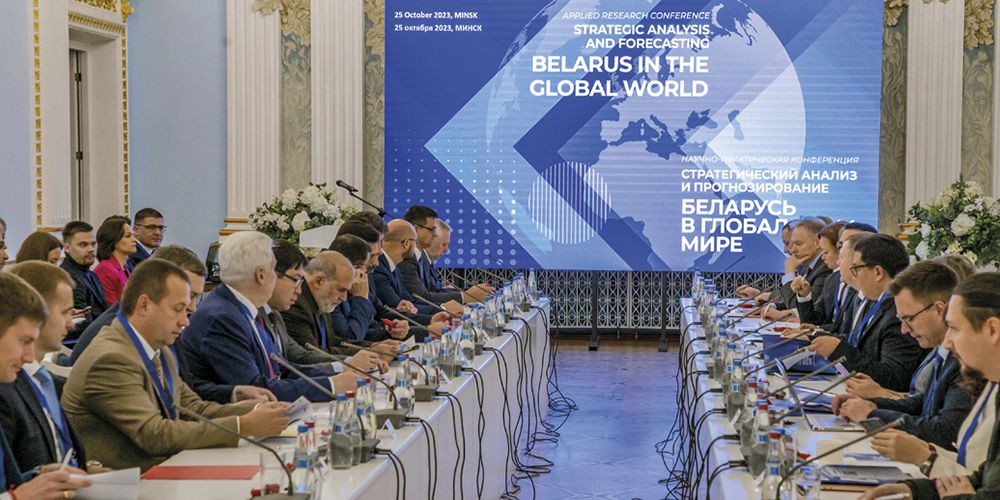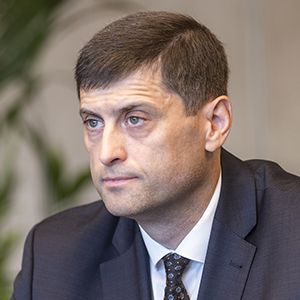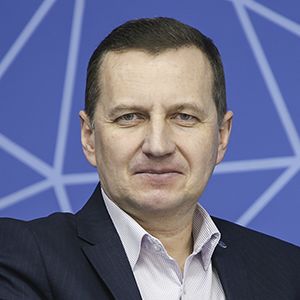Search

Publications
Enhancement of the CSTO Institutional Potential in Information and Analytical Sphere

One of the priority areas for Belarus in the period when it chairs the Collective Security Treaty Organization (CSTO) in 2023 was systemic enhancement of the CSTO institutional potential in the information and analytical sphere.
Setting the objectives and tasks
Across many years, Alexander Lukashenko, the President of the Republic of Belarus, has been speaking about the important objective to enhance the forecasting and analytical components in the CSTO activities in the context of the need for more efficient response to the new security threats and challenges.
Forming the network of national analytical institutes for strategic studies and think tanks in the SCTO member countries (the network) should be an important contribution to achieving this objective and should mobilize the research and expert potential for the common tasks of assuring peace and security.
Belarus also launched an initiative to hold a meeting of the heads of such national institutes and think tanks in Minsk to give an impetus for the organization to work along these lines.
In June 2023, during the meeting with the CSTO Foreign Affairs Ministers in Minsk, the leader of Belarus once again emphasized the necessity of mobilizing the available potential: «We need to learn to enhance our efforts in the information and analytical sphere and in cooperation with the mass media».
We believe that this topic also will be included into the agenda of the forthcoming session of the CSTO Collective Security Council in Minsk.
Based on the instructions by the head of the state, the Belarusian Institute of Strategic Research (BISR) as a leading national analytical center and in cooperation with the Foreign Affairs Ministry of Belarus, the State Secretariat of the Belarus Security Council and the CSTO Secretariat is actively engaged in reviewing these issues with partner organizations in the CSTO member states.
Interim results
As of now, we can state that the basic task of facilitating the interaction of analytical centers and think tanks across the CSTO is being successfully resolved:
- Regular bilateral contacts at the level of heads and experts of the majority of institutes are maintained, including during the major international forums;
- The spectrum of cooperation within the Russian expert community is broadening, the process of formalizing the bilateral relations continues: in 2023, BISR signed the Memorandum of Cooperation with the Center for Strategic Studies with the President of the Republic of Tajikistan, with the Project Management Office with the President of Russia V.V. Putin Ц the Agency for Strategic Initiatives (ASI), with the Caspian Institute for Strategic Studies (CISS), with the National Research Institute for Global Economy and International Relations named after E.M. Primakov (IMEMO RAS);
- Regular consultations are being held with the partners from CSTO at the forums of other international associations (e.g., Shanghai Cooperation Organization Ц SCO).
The contacts with the Expert and Consulting Council with the CSTO Parliamentary Assembly Council are developing. This May, BISR and the Secretariat of this body also signed the Memorandum of Cooperation.
At the same time, we need to emphasize that the most intensive and the most effective is the interaction between the research centers of Belarus and Russia, it is the benchmark and the example for all the CSTO member states.
The CSTO Secretariat quickly responded to the request and used its in-house resources to prepare a series of high-quality issues of analytical bulletin. We believe that this practice should be developed and scaled up.
Problems
At the same time, there is no commonly accepted methodology of supra-national analytics. It is difficult to find the forms of interaction within international organizations, which would satisfy all the partners. It means that the value of encouraging bilateral cooperation and forming the international system of training analysts is growing in the modern environment.
This conclusion was clearly confirmed during the thematic research-to-practice conference «Strategic analysis and forecasting. Belarus in the global world» held by BISR this October in Minsk, as well as during the high-level international conference «Eurasian security: reality and prospects in the transforming world». Professional insights and BISR best practices in the sphere of the strategic analytics methodology were presented to foreign colleagues including those from CSTO member countries. The follow-up interest to BISR materials confirms the conclusion about the need for further efforts to share the best practices among specialists.
For example, in this context it is possible to consider the successful practices available in the CIS area (Uzbekistan) in the sphere of supporting the high-level meetings by the meetings at the level of experts.
The availability of national and supra-national interests, exchanges of sensitive information require new forms of organizing the interaction to assure the interfaces of approaches and methods of work.
Different subordination and specialization of the institutes for strategic studies in the STO member countries hampers the efficiency of interaction.
In this relation, regular (annual) thematic meetings of CSTO experts and analysts in multi-lateral format would to a great extent contribute to efficient search for solutions and to debottlenecking the acute issues of the CSTO agenda by helping to strengthen internal cooperation, mutual trust and unity, which are a true value nowadays.
Thus, the need for improving the coordination role of the CSTO Secretariat is obvious in the process of developing the transparent and easy mechanism for cooperation between the institutes.
The set-up of a dedicated Center of analytical work and strategic planning with the CSTO Secretariat could contribute to intensification of such dialogue.
The objective of creating and launching the network of institutes in line with the initial goal-setting requires priority attention on behalf of the stakeholders with account of the political will of the national leaders of the CSTO member states.
The availability of the commonly acknowledged training centers for analysts will contribute to forming the framework of principles, organization formats for theoretical and practical analytical work across the CSTO area. Belarus will be committed to setting up a core training cluster, and one of the very first steps could be launching the respective BISR training centers.
All the considered options have their pros and contras, but in general they bring a number of issues to the radar including the resourcing of such centers.
Going forward
The dual objective set by A.G. Lukashenko, the President of Belarus, to enhance the analytical and forecasting element in CSTO and its institutional potential is being systemically and step-by-step resolved despite certain difficulties. At the same time, the results achieved mean only the need for critical assessment of what has already been accomplished and to continue this effort with account of the adjustment to the Road Map.
According to BISR, the optimal model for organizing the coordinated expert and analytical work in CSTO is the SCO Forum, which has proved to be a positive example.
The SCO Forum was established in 2006 as a consulting expert mechanism with the purpose of scientific support of the initiatives and decisions by the heads of the member states made at the annual summits. It includes one research center or think tank from each member state with the status of the National research center assigned in accordance with the internal legal procedures. The Forum is headed on rotational basis and operates in close contact with the Secretariat, the National Coordinators Council and the Foreign Affairs Ministries of the SCO member states.
At the same time, to avoid ambiguity, in the CSTO member countries it would be possible to formally appoint the authorized analytical center, which will in essence become the national expert diplomacy entity.
The SCO Forum Regulation is to a certain extent similar to Think20 (T20) Ц the official contact group («the suggestion box») of the G20, uniting the leading analytical centers and high-level experts, developing recommendations for task forces, ministerial meeting and summits of the national leaders of the G20 member states. T20 is also headed based on the rotation principle Ц by the country chairing the G20.
The semi-annual conferences are held. Based on their recommendations and proposals the agenda and draft press release of the final T20 summit are prepared, which are then often used for developing the joint statement of the G20 countriesТ leaders. In addition to the developments of the target groups, this document is also based in various analytical memos of researchers across the world. By the way, India engaged the public at large into this kind of work within the project «The T20 Suggestion Box».
It should be highlighted that similar format is also used in G7 Ц Think7, which is closely interacting with Think20. Their last coordination meeting took place in New York on the sidelines of the 8th session of the UN General Assembly.
It is obvious that in the conditions of todayТs global confrontation and the new world order evolvement the role of expert diplomacy is growing exponentially. Especially as the traditional external communication channels get into the toxic zone and are forced to balance, or using them does not bring the desirable result or is unfeasible in the specific circumstances.
In relation to this, the systemic request for high-quality expert assessment of the deep essence of the current processes and their potential consequences is quite justifiable, especially for the development of draft managerial decisions, and the CSTO is not an exclusion here. That is why national states are focusing and will continue to focus on interaction with the expert communities and on enhancement of their analytical centers and think tanks. Obviously, focusing just on their own problems and avoiding interaction they cannot guarantee high-quality expert assessment. So, the international contacts of experts from different countries come to the fore, and they need to be broad, not limited to just the CSTO framework.
The initiative of the President of the Republic of Belarus about the combination of efforts and synergy of the capabilities of CSTO, BRICS, EAEU and SCO quite naturally fits into this context. The successful implementation of this initiative would provide for, among other tasks, creating the «seamless» and mutually integrated expert space within the Bigger Eurasia and its extended neighborhood. Such space will harmoniously complement the indivisible zone of sustainable development and security. The accumulated practices of coordinating the efforts of the G20 and G7 expert tracks is a confirmation of such possibility and a great example worth to be adopted.








